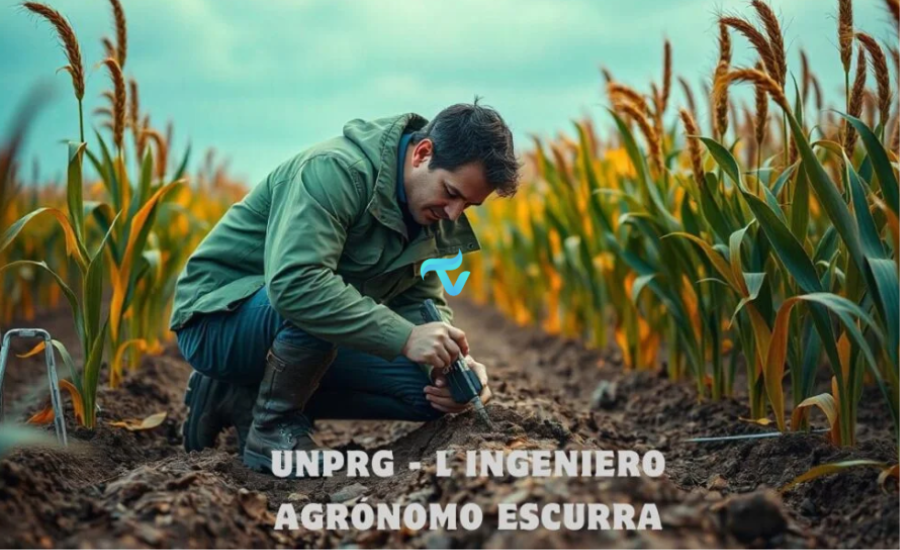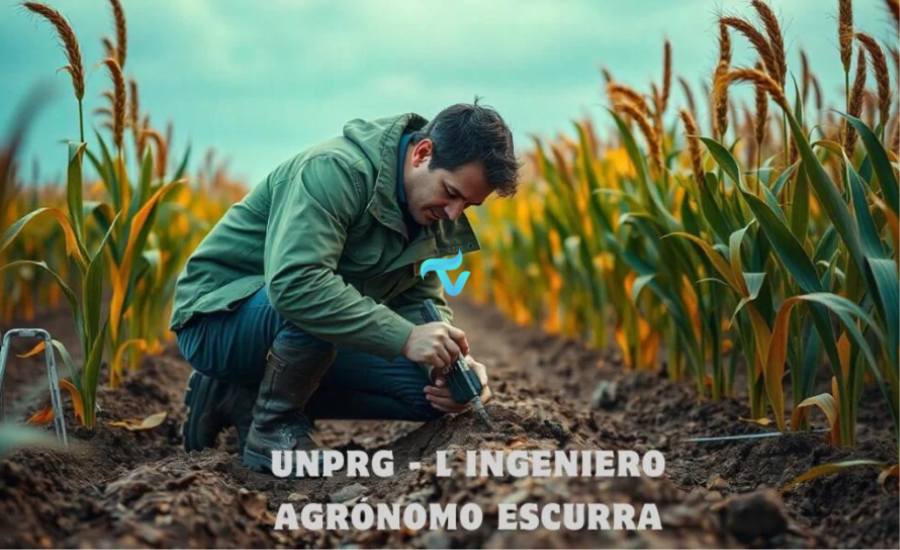The agriculture industry has experienced significant transformation in recent years, driven by innovative technologies and modern farming techniques aimed at enhancing both productivity and sustainability. At the heart of these advancements are agricultural engineers, whose expertise is crucial in shaping agricultural systems, optimizing food production, and promoting sustainable farming practices. These professionals work to design systems that improve efficiency, reduce environmental impact, and support the well-being of rural communities, making them key players in the future of agriculture.
One such influential figure in the field is Unprg – Ingeniero Agrónomo Escurra Clso. His contributions have played a vital role in advancing sustainable farming solutions, including the development of water-efficient irrigation systems and soil management practices. His work exemplifies how agricultural engineers are pioneering innovative techniques that address pressing issues like climate change, resource conservation, and food security. As a leader in the field, Escurra Clso’s expertise continues to shape the direction of modern farming.
This article explores the growing career opportunities in agricultural engineering, highlighting the essential role of professionals like Escurra Clso in driving progress. With the demand for sustainable agricultural practices on the rise, agricultural engineers are becoming increasingly important in developing solutions that meet global food demands while protecting the environment. The future of agriculture is closely tied to the contributions of experts like Escurra Clso, whose work is helping to shape the agricultural revolution.
The Role Of Agricultural Engineers

Agricultural engineering is a dynamic discipline that blends principles of biology, mechanical engineering, and technology to address challenges in agriculture. Professionals in this field work on a variety of tasks, from enhancing irrigation systems and developing farming machinery to promoting sustainable land management practices. The goal of agricultural engineers is to improve farming efficiency while minimizing negative environmental impacts and promoting the well-being of rural communities.
In addition to focusing on crop production, agricultural engineers also aim to improve food processing methods, soil health, and the integration of cutting-edge technologies that reduce manual labor. With growing concerns over food security, climate change, and environmental sustainability, the demand for agricultural engineers is higher than ever.
Key Responsibilities Of Agricultural Engineers
An agricultural engineer’s workday can vary based on specialization, but some common tasks include:
- Irrigation and Water Management: Designing water distribution systems that optimize crop irrigation while conserving water and preventing erosion.
- Environmental Sustainability: Implementing agricultural practices that protect ecosystems, reduce waste, and preserve soil health for long-term productivity.
- Farm Mechanization: Developing and improving farming machinery, from tractors to harvesters, to enhance efficiency and reduce labor.
- Soil and Crop Management: Understanding soil properties and crop behaviors to improve yields and ensure sustainable farming practices.
- Food Processing: Developing new methods to process food, extending shelf life, and reducing waste.
Unprg – Ingeniero Agrónomo Escurra Clso exemplifies how agricultural engineers can significantly impact the industry by offering sustainable solutions and enhancing productivity through innovation and expertise.
The Path To Becoming An Agricultural Engineer

Agricultural engineering is an interdisciplinary field that requires a solid foundation in both agricultural sciences and engineering principles. Those pursuing a career as an agricultural engineer typically start with a bachelor’s degree in agricultural engineering or a related field. Coursework often includes biology, chemistry, physics, mathematics, and specialized subjects such as hydrology, soil mechanics, and agricultural systems.
For those looking to deepen their expertise, graduate degrees in specialized fields such as water management, renewable energy applications, or sustainable agriculture provide opportunities for research roles, teaching positions, and leadership positions in public or private sectors.
Unprg – Ingeniero Agrónomo Escurra Clso background reflects this multidisciplinary approach, as his academic and practical experiences have shaped his contributions to sustainable agricultural practices, aligning engineering with agronomy to advance global farming solutions.
Core Skills For Success In Agricultural Engineering
To thrive in agricultural engineering, professionals need to hone several key skills beyond technical expertise, including:
- Problem-Solving: Agricultural engineers must think creatively to solve complex challenges in agriculture, from designing systems to tackling resource shortages.
- Technical Knowledge: A deep understanding of engineering tools, machinery, and computer systems is vital for designing and optimizing agricultural technologies.
- Communication: Engineers must often collaborate with diverse stakeholders, including farmers, policymakers, and researchers, making strong communication skills essential.
- Environmental Consciousness: Given the rising importance of sustainability, agricultural engineers need to understand environmental challenges and integrate eco-friendly practices into their solutions.
Career Opportunities For Agricultural Engineers

The agricultural engineering field offers diverse career opportunities, driven by the increasing demand for sustainable and efficient farming methods to address global food security and environmental concerns.
Key Industries for Agricultural Engineers
- Agricultural Equipment Manufacturing: Engineers design and improve farming equipment such as irrigation systems, tractors, and harvesters, with opportunities in R&D, testing, and production.
- Government Agencies: Many agricultural engineers work with government entities focused on food security, land management, and agricultural policy development.
- Consulting Services: Agricultural engineers offer consulting services to farmers and businesses, advising on sustainable farming practices, resource management, and efficiency improvements.
- Research and Development: Engineers contribute to research institutions or universities, developing new agricultural technologies, enhancing food production, and improving farming methods.
- Sustainable Agriculture: As the focus on sustainability grows, agricultural engineers play an integral role in NGOs and nonprofit organizations, working on soil conservation, water management, and climate-resilient agriculture.
Unprg – Ingeniero Agrónomo Escurra Clso career highlights the broad spectrum of opportunities within agricultural engineering, underscoring the potential for professionals in this field to influence both research and hands-on farming practices.
The Future Of Agricultural Engineering
The future of agricultural engineering is bright, with increasing emphasis on technology and sustainability in farming. Engineers will continue to play a crucial role in developing solutions to global challenges such as climate change, resource scarcity, and food security. Emerging technologies, like precision agriculture, automation, and robotics, are set to reshape the industry and make farming more efficient and eco-friendly.
Emerging Trends
- Precision Agriculture: The use of data-driven technologies such as drones, sensors, and AI analytics is enhancing farming practices by enabling farmers to make more informed decisions regarding crop management and resource allocation.
- Sustainability: Agricultural engineers will continue to develop methods that minimize environmental impact, conserve water, reduce carbon emissions, and enhance soil health.
- Automation and Robotics: Automated systems and robots are revolutionizing farming by handling tasks that were once labor-intensive, such as planting, harvesting, and sorting crops.
Challenges Ahead
Despite these exciting prospects, agricultural engineers must navigate challenges such as:
- Climate Change: Developing resilient farming systems that can cope with extreme weather conditions remains a significant hurdle.
- Resource Scarcity: As populations rise, the demand for finite resources like water and arable land will intensify, requiring engineers to find innovative solutions for resource management.
- Economic Barriers: In many regions, the high cost of implementing new technologies can be prohibitive, particularly for small-scale farmers in developing countries.
Unprg – Ingeniero Agrónomo Escurra Clso Contributions To Agricultural Engineering
Unprg – Ingeniero Agrónomo Escurra Clso has made remarkable contributions to the agricultural sector, particularly in advancing sustainable farming practices. His work in irrigation, soil health, and crop management has led to more efficient and eco-friendly farming systems.
One of Unprg – Ingeniero Agrónomo Escurra Clso standout achievements is his focus on sustainable farming solutions. He has developed irrigation systems that reduce water waste and pioneered soil management strategies that prevent erosion and improve fertility. By integrating precision agriculture techniques such as drones and data analytics, he has helped farmers optimize crop yields while minimizing costs and environmental harm.
Unprg – Ingeniero Agrónomo Escurra Clso research on drought-resistant crops and crop rotation has also contributed to the development of farming systems that can withstand extreme weather, addressing the increasing challenges posed by climate change. His approach emphasizes community involvement, ensuring that local farmers receive the training and support they need to implement sustainable practices effectively.
Fun Facts About Unprg – Ingeniero Agrónomo Escurra Clso
- Agricultural Engineering Innovations: The use of drones in agriculture for monitoring crop health and managing water usage is one of the most cutting-edge technologies in the field, thanks to agricultural engineers like Escurra Clso.
- Water Conservation: Ingeniero Escurra Clso has been instrumental in creating irrigation systems that use 30% less water than traditional methods, contributing to sustainable farming practices.
- Sustainable Solutions: Over 70% of the world’s fresh water is used in agriculture. Engineers are developing more efficient systems to reduce this consumption, a priority for experts like Escurra Clso.
- Drought-Resistant Crops: Escurra Clso’s research into drought-resistant crops has helped create agricultural systems that can survive in harsher climates, making farming more resilient to climate change.
- Farmers and Technology: Agricultural engineers are helping farmers who traditionally relied on manual labor to transition to automated systems, increasing both productivity and efficiency.
FAQs About Unprg – Ingeniero Agrónomo Escurra Clso
Q: What does an agricultural engineer do?
A: An agricultural engineer designs and improves systems like irrigation, farm machinery, and food processing methods to enhance farming efficiency while minimizing environmental impact.
Q: What skills are needed to become an agricultural engineer?
A: Essential skills include problem-solving, technical proficiency with machinery, communication, and an understanding of environmental sustainability.
Q: How do agricultural engineers contribute to sustainability?
A: They develop systems that reduce water usage, prevent soil erosion, and improve crop yields, all while preserving natural resources for future generations.
Q: What are the career opportunities in agricultural engineering?
A: Agricultural engineers can work in equipment manufacturing, government agencies, consulting, research, and sustainable agriculture projects.
Q: How has Ingeniero Agrónomo Escurra Clso influenced agriculture?
A: Escurra Clso has advanced sustainable farming by developing water-efficient irrigation systems, improving soil health, and researching drought-resistant crops.
Conclusion
Agricultural engineering is rapidly evolving, with leaders like Unprg – Ingeniero Agrónomo Escurra Clso playing a key role in driving sustainable practices. His work in water conservation, crop management, and sustainable farming addresses pressing global challenges such as climate change and food security.
As technology advances, the future of agricultural engineering looks promising, offering innovative solutions to make farming more efficient and eco-friendly. The integration of cutting-edge research with practical applications will continue to transform agricultural systems, benefiting farmers, communities, and the environment.
Stay connected for the latest updates and notifications by checking out our website: Business Fan Zine!

